5 of the Best Portrayals of Cinematic Sociopaths
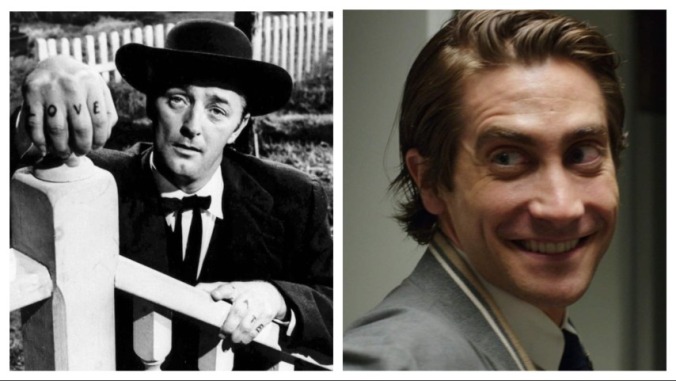
The concepts of sociopathy or psychopathy are unique, in the sense that they are perhaps more commonly depicted in the world of entertainment or pop culture than within the medical field itself. Movies and TV have led many of us to believe that there are concrete definitions for said terms, when in reality, such easily referenced source materials don’t really exist. Someone working in the field of psychology may accept a specific definition for a term like “sociopath,” but their colleague may vehemently disagree on whether that term is accurate or even useful. Most depictions of a sociopath or psychopath character would fall under the broader spectrum of Antisocial Personality Disorder, but even that refers to an extremely wide-ranging, complex set of pathologies. Suffice to say: The brain is a complicated thing, and it defies easy labels.
But with that said, films have always been drawn to the concept of sociopathy as a way to portray those who can’t (or actively won’t) live within the rules of society. Sociopathic or psychopathic characters have been around as long as cinema itself, portrayed with varying degrees of accuracy, empathy and consideration for the medical profession. Early psychopaths were all too often portrayed as ravening beasts who had little to no control over themselves, and although issues with impulse control are certainly a hallmark of these pathologies, these portrayals of cinematic psychopaths too often failed to take into account how calculating and manipulative these types of antagonists could actually be. In subsequent decades, so many classic cinematic villains have worn the title of psychopath, from Patrick Bateman, to Hannibal Lecter, to Anton Chigurh. Those are perhaps the first few that come to mind, but let’s dive a little bit deeper, to a few that might not be quite so obvious.
Let’s take a quick cinematic, trip, then, through five of the more influential and chilling cinematic interpretations of psychopathy and sociopathy, from several distinct eras of filmmaking, and see what makes each portrayal unique.
1. Hans Beckert, M, 1931
Director: Fritz Lang
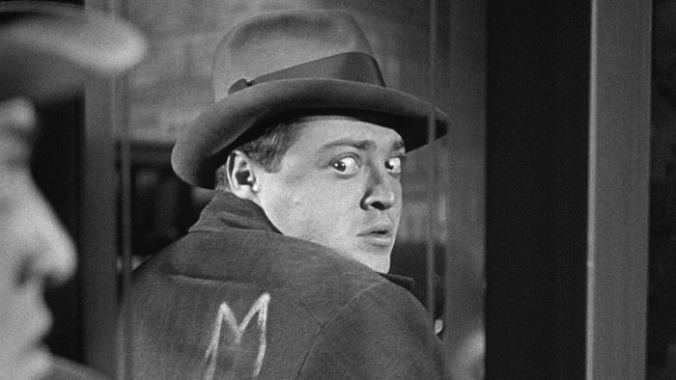
At the dawn of the sound age, filmmakers were already falling back on the nascent idea of the cinematic psychopath as antagonist, but director Fritz Lang (of Metropolis and other silent classics) upended these simplistic portrayals with a far more nuanced and empathetic depiction in M, courtesy of the great Peter Lorre’s performance. As the child-killing Hans Beckert, he demonstrates a psychopath’s inability to empathize with others, while simultaneously demanding empathy from the public for himself once his crimes are discovered. Lang, one of the few prominent silent era filmmakers to effectively make the leap to sound films, uses the newly emerged art form to depict some of the compulsions that drive Beckert–including his compulsion to repeatedly whistle Grieg’s “In the Hall of the Mountain King,” which proves to be his undoing.
So too does Lorre fall back on those compulsions in his performance, but he attempts to wield them as a shield in his own defense. Captured by the city’s criminal underground and put on trial as a child murderer in a kangaroo court, Beckert argues that he can’t truly be held accountable for his actions, because he’s a slave to irresistible compulsions over which he has no control. He condemns those around him who would dare to judge him, saying that they have the ability to stop themselves from committing crimes, but that he has no such freedom, being a slave to his “dark passenger,” as Dexter would put it many decades later. In doing so, Beckert is able to protect himself from any form of self-reflection or responsibility, abdicating the need to have those higher-level ethical discussions by portraying himself as powerless to his own whims.
It’s a surprisingly nuanced depiction of the sort of mental gymnastics that a psychopath is able to put themselves through in order to reframe the scenario so that they are perpetually the victim rather than the antagonist.
2. Harry Powell, The Night of the Hunter, 1955
Director: Charles Laughton
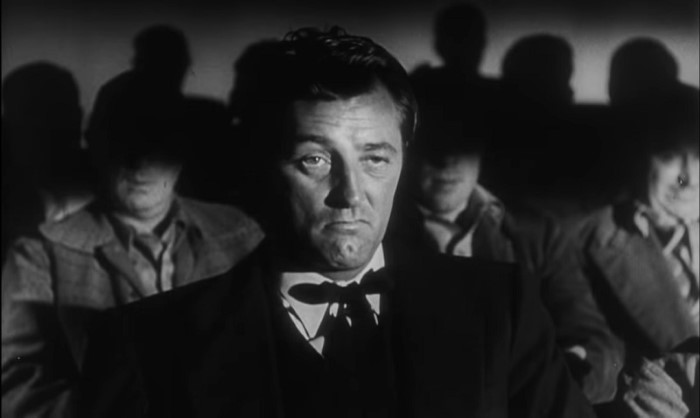
Rev. Harry Powell, the coldly calculating villain of director Charles Laughton’s iconic noir thriller The Night of the Hunter, is a particularly chilling and remorseless killer, even on a list that has several of them. Whereas the likes of Hans Beckert seem to experience anxiety and a need to desperately flail and rationalize their own evil actions, Powell feels no such need for absolution, which makes his guise of a preacher all the more hypocritical. He’s terrifyingly secure in the sense of superiority and plain old greed that motivates him, a man who perpetually takes from others and contributes nothing to the betterment of the world. He’s a consummate user of other people.
Powell doesn’t just lack in any kind of empathy for others; he seems to feel in his own strange, roundabout way that what he does when he preys on lonely widows is somehow justified or part of a higher calling. He’s intensely misogynistic, to the point that women disgust him so much that he doesn’t even take advantage of his ability to physically seduce them with his superficial, masculine charm. Even after marrying the sympathetic widow Willa, he doesn’t feel he has inherited any kind of responsibility for her two young children–he callously kills their mother once she begins to suspect what kind of person he truly is, and then acts more or less like the kids aren’t even there except for the fact that he needs information about hidden cash from them. He displays a notable lack of anxiety in the way he disposes of Willa’s body, sinking her in her old car in the middle of the river–not exactly out of sight, but the lack of fear Powell possesses over the potential discovery of his crimes is a classic marker of psychopathic behavior. It’s a self-destructive tendency that finally leads Powell to his doom.
3. Rhoda Penmark, The Bad Seed, 1956
Director: Mervyn LeRoy
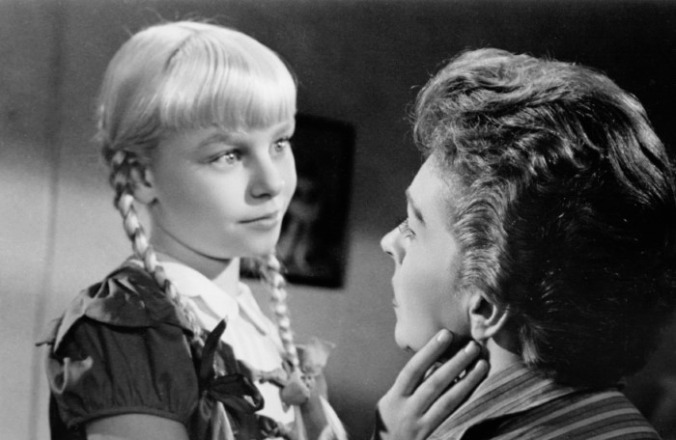
Cinematic psychopaths come in all shapes and forms, but The Bad Seed was honestly quite bold in how genuinely it explored the idea that this kind of behavior could even be present in the expected innocence of childhood. And to be sure, spotting a sociopath or psychopath among a group of kids is a far more difficult endeavor than identifying one in adult society, because what kid doesn’t express self-serving ideology or lack of social awareness at times? If left to their own devices, most any kid can develop into what one might term a spoiled brat, but Rhoda Penmark pushes far beyond that designation. Her disturbingly adult outlook on the world is based in a bratty, greedy compulsion to take whatever she can get, but she simultaneously possesses a more mature sense of cunning that allows her to take full advantage of how most of society sees her: As a sweet little girl who couldn’t possibly hurt anyone.
Of course, that isn’t true–Rhoda is a budding little serial killer, one who has already killed at the slightest of provocations. She genuinely seems to possess no conception whatsoever of right and wrong, seeing people as nothing but disposable obstacles standing in the way of her momentary desires. She’s distinctly cruel, taunting and rubbing her victories in the face of others, seeming to desire causing the maximum amount of upset in others. She seems to largely lack any positive emotions, and can only feign them for the sake of manipulation, though her ability here is still developing. One gets the sense that if Rhoda makes it to adulthood, she will truly become a terrifying force, someone who has mastered the ability to prey on the emotions of others and manipulate everyone around her. But at the same time, as a psychopathic child Rhoda has a severe lack of impulse control, leading her to take huge and unnecessary risks. Her mother ultimately becomes roped into the tangled web of murder and culpability, blaming herself even as she debates whether to shield her daughter from justice. Rhoda stands out as an absolute worst-case scenario for any aspiring parent.
4. Tom Ripley, The Talented Mr. Ripley, 1999
Director: Anthony Minghella

As a sociopath, The Talented Mr. Ripley’s title character, Tom Ripley, isn’t driven inherently by some kind of violent undercurrent or bloodlust. Theoretically, this is one instance where the character could have conceivably gone his entire life without hurting or killing anyone … provided he always gets what he wants. What Ripley is, is delusional–he’s obsessively jealous of people and status, feeling that the world owes him something more than what he can possess. From the moment he sees Jude Law’s Dickie Greenleaf, all he wants is to not only possess him but to be him. And if he can’t have the object of his infatuation, then nobody else will, either.
Tom Ripley is a fascinating study in contrasts. He’s wickedly intelligent, fast-thinking and able to maneuver out of almost any situation, but the life-and-death situations he ends up in are pretty much entirely a result of his own spur-of-the-moment choices. He lies compulsively, even when there’s no particular reason to use a lie rather than the truth, seeming to do it mostly to avoid boredom. This is classic sociopathic behavior, filling a constant need for stimulation in life. Ripley is obsessed with status, and ultimately much of his behavior seems to be driven by his held belief that it’s superior to be a “somebody,” even as a fake, than it would be to be a “nobody” in reality. He chooses to delude himself as to whether his goals can be reasonably and safely achieved, and then repeatedly resorts to violence each time he’s about to be confronted or exposed. But even though this happens over and over, it makes no difference in Ripley’s underlying delusions that he can still piece everything back together again. In his eyes, much of what he does is for love, but he’s unable to see that he doesn’t truly understand love or genuine human connection, mistaking an all-consuming desire to possess a thing as genuine love of it.
5. Lou Bloom, Nightcrawler, 2014
Director: Dan Gilroy
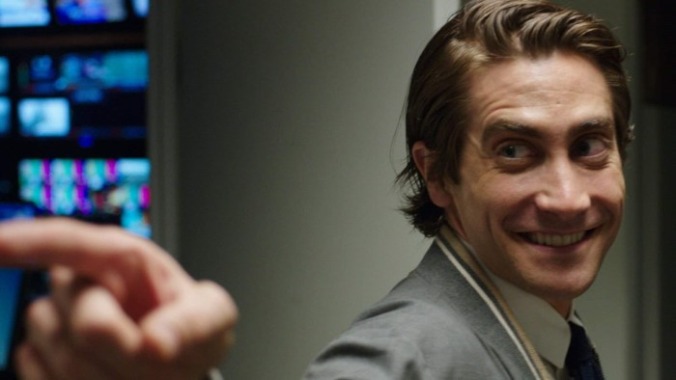
In terms of depictions of cinematic sociopaths likely to make your skin crawl with sheer revulsion, few will rank as more disconcerting than the performance of Jake Gyllenhaal as the ultra-manipulative Lou Bloom in Dan Gilroy’s Nightcrawler. This is a guy with no human feeling of any kind, an empty shell of a man who, like Ripley, is motivated more than anything by a need for stimulation, which he finally finds as a stringer photographer who becomes embedded in the late night world of TV crime and accident coverage.
You really can’t overstate the emptiness of Bloom–there’s absolutely nothing authentic in him, in the way he presents himself to the world, a defense mechanism that keeps him from ever being the least bit vulnerable. He projects a constant energy of intensity and seriousness, making superficial attempts at kindness or humor that are all entirely fake. Indeed, he really doesn’t seem to have a great understanding of why anyone around him says or does anything, so unfamiliar is he on a base level with humanity. He’s like an alien or android trying to parse the information, learning and copying the things he sees as he tries to invert them to serve his own purposes. His one driving instinct is that–like an alien hiding among us–he wants to fit in, to be vaguely “successful,” but it’s not really clear to what end he would want that. Like Patrick Bateman, he mostly seems to want those things as part of a constructed personality, because he feels like that’s what a “normal” man is supposed to want. He doesn’t know what else to do with himself.
Ultimately, everything Bloom says serves a specific goal, typically to manipulate others into giving him his immediate desires, or break down the defenses of people who might otherwise resist him. He is devoid of a sense of self, or if he does have a true self, he understands that this self is so inherently repellent, inhuman and monstrous that he can’t ever let it out, or he would be confronted by pitchfork and torch-wielding villagers. He just continues going through the motions of faking a human life.
Jim Vorel is Paste’s Movies editor and resident genre geek. You can follow him on Twitter for more film writing.







































